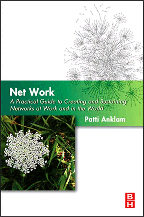Scenarios as sense-making
Art Hutchinson (no relation other than we are friends)wrote a superb blog on his attendance at a recent IIS (International Intelligence Summit) in Crystal City, Virginia. I first met Art about 8 or so years ago when he was at Northeast Consulting Resources Inc, a dynamic strategy consulting firm that invented a scenario-based method call FutureMapping. (NCRI merged into Nerve Wire in 2000; Nerve Wire was purchased by Wipro in 2003).
Lately, my thinking has been focusing “above the playing field” in ONA to look at other valuable ways that visual maps offer sense-makingg, especially since I started working with Verna Allee and using ValueNet Works(TM) analysis. They are very complementary views — the personal vs the organizational exchange mapping is an area I’m working on with Verna and her colleague Oliver Schwabe.
To these views, I’ve been adding the network market map view, based on work by Laurence Lock Lee, who is working on a PhD thesis about the correlation between centrality in a market map and social capital. (No references yet). Valdis Krebs has an example of such a map on his site of the Internet industry (2002).
The scenario view that emerges from a FutureMapping workshop gives yet another perspective to help a group understand its context both with respect to market forces and the network of companies in its industry and supplier network.
And, like all the methods that produce maps, the vital result is the conversation that emerges from both creating and reviewing the maps themselves. Here are some salient points that Art makes in his post:
More eyes and more minds make for more understanding.
Art emphasizes this in talking about how important the distributed collective intelligence of blogs, wikis, and prediction markets in order to plumb the depths of understanding of large complex events. But this is also true of the smaller-scale, group oriented methods. ONA and VNA are most useful when they bring a variety of interpretations and knowledge into the interpretation process.
Rehearse for the future. If orchestras, sports teams, and military units spend as much as 75% of their time rehearsing, why not management? We can play “what-if” scenarios during the ONA analysis process to see the potential impact of losing key people or perhaps adding additional connections. Having these scenarios in mind will enable managers to respond effectively with rehearsed strategies.
The difference between actuarial uncertainty and creative uncertainty.
Companies are interested in ONA as a tool to help understand the actual impact of the ageing workforce and planning appropriately. But are they equally prepared to respond with a network view when a disruptive innovation threatens the business?





1Victoria G. Axelrod
wrote on 22 March 2006 at 8:20
Patti,
Thank you for this excellent post. I brought the Northeast Consulting Group into the American Management Association in the late 90’s. The FutureMapping process was instrumental in building off of previous work we had done involving all of the stakeholders or network of the organization.
In retrospect, I see the need for someone to be identified in organizations, as we move forward with network models, to be the “Net Weaver” Valdis Krebs describes.
Without this role and organizational skill much knowledge and network strength will be lost in times of corporate reorganizations, m&a;, etc.
Victoria Axelrod
2Art Hutchinson
wrote on 23 March 2006 at 11:57
Great post Patti! (OK, I’m biased… Blush. Thanks.) I’ve been a longtime fan of maps (all kinds) as tools for collective sense-making and what I like to call strategic navigation. Where words fail, rich, multi-layered pictures pick up. In particular, the maps you create using ONA and VNA techniques seem like they’d be great supplements to (or even replacements for) the future endstates and conventional wisdom maps we develop with clients in interactive scenario workshops. I.e., hypothetical maps can be as valuable as maps of current, known reality. Time to have lunch and draw on some napkins!